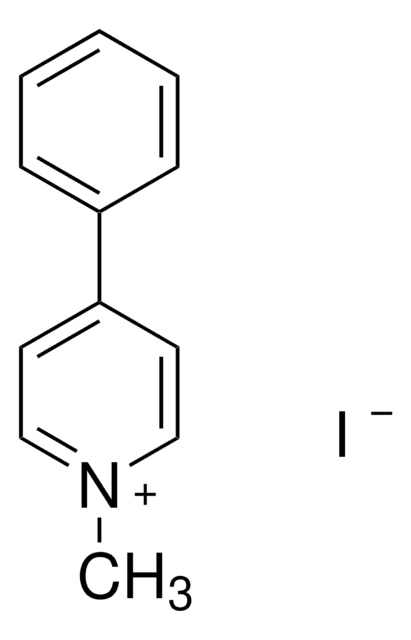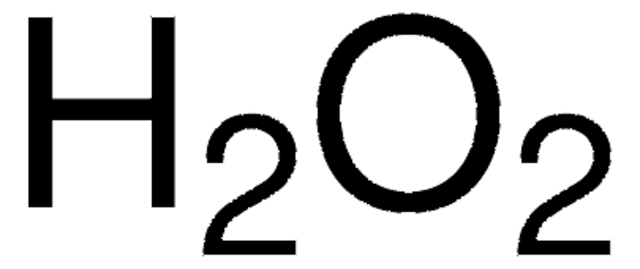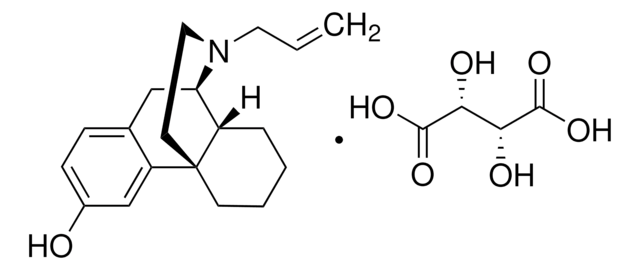M0896
MPTP Hydrochloride
≥98% (AgNO3), powder, dopaminergic neurotoxin
동의어(들):
MPTP HCl, Pyridine, 1,2,3,6-tetrahydro-1-methyl-4-phenyl-, hydrochloride, MPTP hydrochloride
로그인조직 및 계약 가격 보기
모든 사진(1)
About This Item
실험식(Hill 표기법):
C12H15N · HCl
CAS Number:
Molecular Weight:
209.72
Beilstein:
3707312
MDL number:
UNSPSC 코드:
12352200
PubChem Substance ID:
NACRES:
NA.77
추천 제품
제품명
1-Methyl-4-phenyl-1,2,3,6-tetrahydropyridine hydrochloride, powder
양식
powder
Quality Level
drug control
kontrollierte Droge in Deutschland
색상
white to off-white
SMILES string
Cl[H].CN1CCC(=CC1)c2ccccc2
InChI
1S/C12H15N.ClH/c1-13-9-7-12(8-10-13)11-5-3-2-4-6-11;/h2-7H,8-10H2,1H3;1H
InChI key
KOWJANGMTAZWDT-UHFFFAOYSA-N
유사한 제품을 찾으십니까? 방문 제품 비교 안내
일반 설명
MPTP shows its effects by causing inflammation, excitotoxicity, mitochondrial apoptosis, formation of inclusion bodies, and oxidative stress that leads to dopaminergic neuronal damage in the striatum and substantia nigra. In dopaminergic neurons, MPTP blocks the mitochondrial complex I which leads to mitochondrial dysfunction.
애플리케이션
1-Methyl-4-phenyl-1,2,3,6-tetrahydropyridine hydrochloride has been used to induce Parkinson′s disease (PD) in animal models:
- to study the effect of docosahexaenoic acid on the apelin distribution of the nervous system
- to study the behavioral impairments correlated to neurochemical deficits
- to study the effects of treadmill exercise on neuroprotection and neuroinflammation
MPTP has been used to study its effects on microglial innate immune memory. It has also been used to study the protective effects of phenylpropionamides in Pakinson’s diseased mice models.
생화학적/생리학적 작용
1-Methyl-4-phenyl-1,2,3,6-tetrahydropyridine (MPTP) is a piperidine derivative and dopaminergic neurotoxin, useful in neurological research. MPTP is metabolized to 1-methyl-4-phenylpyridine (MPP+), which in turn can cause free radical production in vivo and lead to oxidative stress. Thus MPP+ is generally acknowledged as the active metabolite of MPTP. MPTP is widely used in in vivo research studies as a model for Parkinsonism. A review describes the application of MPTP in studies related to programmed cell death in neurogenerative diseases.
Dopaminergic neurotoxin.
경고
Reportedly causes a severe and irreversible Parkinsonian condition in humans and monkeys.
신호어
Danger
유해 및 위험 성명서
Hazard Classifications
Acute Tox. 3 Oral - STOT SE 1
표적 기관
Nervous system
Storage Class Code
6.1C - Combustible acute toxic Cat.3 / toxic compounds or compounds which causing chronic effects
WGK
WGK 3
이미 열람한 고객
Isoquinuclidines: a review of chemical and pharmacological properties
Khan MOF, et al.
Studies in Natural Products Chemistry, 34, 753-787 (2008)
Yuliya V Medvedeva et al.
The Journal of neuroscience : the official journal of the Society for Neuroscience, 29(4), 1105-1114 (2009-01-30)
Despite considerable evidence for contributions of both Zn(2+) and Ca(2+) in ischemic brain damage, the relative importance of each cation to very early events in injury cascades is not well known. We examined Ca(2+) and Zn(2+) dynamics in hippocampal slices
Fei Sa et al.
Neuroscience letters, 593, 7-12 (2015-03-17)
Dibenzocyclooctadiene lignans represent a unique group of natural chemical structures, are considered as protectants against neuronal cell death and cognitive impairment in neurological disorders. Among the family of dibenzocyclooctadiene lignan analogs from the fruit of Schisandra chinensis (Turcz.) Baill, neuroprotective
N S Sampson et al.
The Journal of biological chemistry, 276(36), 34182-34188 (2001-07-12)
Kidney fibrosis is the hallmark of most types of progressive kidney disease, including the genetic disorder Alport's syndrome. We undertook gene expression analysis in Alport's syndrome mouse kidneys using microchip arrays to characterize the development of fibrosis. In addition to
Irene García-Domínguez et al.
Frontiers in cellular neuroscience, 12, 398-398 (2018-11-22)
The impact of systemic inflammation in nigral dopaminergic cell loss remains unclear. Here, we have investigated the role of peripheral inflammation induced by systemic lipopolysaccharide (LPS) administration in the MPTP-based model of Parkinson's disease. Brain inflammation, microglia and astroglia activation
자사의 과학자팀은 생명 과학, 재료 과학, 화학 합성, 크로마토그래피, 분석 및 기타 많은 영역을 포함한 모든 과학 분야에 경험이 있습니다..
고객지원팀으로 연락바랍니다.











